
Swiss Journal of Palaeontology
metrics 2024
Charting the Course of Life's Evolutionary Journey
Introduction
Swiss Journal of Palaeontology, published by SPRINGER INT PUBL AG, stands as a leading platform for innovative research within the field of paleontology, contributing significantly to the understanding of Earth's historical life forms and their evolutionary pathways. With its ISSN 1664-2376 and E-ISSN 1664-2384, this journal has established a strong presence in academic circles, recognized as a Q1 journal in the category of Paleontology for 2023. Moreover, it ranks 20th out of 113 in the Earth and Planetary Sciences, securing an impressive 82nd percentile on Scopus, underscoring its influence and reach in the scientific community. The journal publishes cutting-edge research findings, theoretical advancements, and comprehensive reviews that span the globe, making it an essential resource for researchers, professionals, and students in the paleontological sciences. For those interested in contributing to and learning from the latest discoveries, the Swiss Journal of Palaeontology promises to be an invaluable addition to your academic library.
Metrics 2024
 0.92
0.92 3.00
3.00 1.90
1.90 16
16Metrics History
Rank 2024
Scopus
IF (Web Of Science)
JCI (Web Of Science)
Quartile History
Similar Journals

STRATIGRAPHY AND GEOLOGICAL CORRELATION
Advancing Geological Insights Through StratigraphySTRATIGRAPHY AND GEOLOGICAL CORRELATION is a prominent scholarly journal published by PLEIADES PUBLISHING INC, featuring a dedicated focus on the fields of geology, stratigraphy, and paleontology. With ISSN 0869-5938 and E-ISSN 1555-6263, this journal has been disseminating significant research findings since its inception in 1994, continuously contributing to the academic discourse through 2024. Despite not currently offering open access, its relevance is underscored by its Category Quartiles for 2023, where it has established itself as Q3 in Geology and Paleontology, and Q2 in Stratigraphy. STRATIGRAPHY AND GEOLOGICAL CORRELATION ranks #29 out of 55 in Stratigraphy and #186 out of 321 in Geology according to Scopus metrics, positioning it within the competitive landscape of Earth and Planetary Sciences. Researchers, professionals, and students are invited to engage with the journal’s content to deepen their understanding and foster innovation within these critical areas of study.
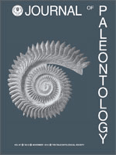
JOURNAL OF PALEONTOLOGY
Unearthing the Secrets of Ancient LifeJOURNAL OF PALEONTOLOGY, published by Cambridge University Press, is a leading scholarly journal dedicated to the field of paleontology, featuring a broad scope that covers fossil studies, evolutionary biology, and earth history. With an ISSN of 0022-3360 and an E-ISSN of 1937-2337, this esteemed journal serves as an essential platform for researchers, professionals, and students to disseminate cutting-edge research findings and insights in paleontological science. The journal holds a significant position within its category, ranking Q2 in the 2023 quartiles and achieving a Scopus rank of #51 out of 113 in Earth and Planetary Sciences – Paleontology, placing it in the 55th percentile of its field. Although it does not currently offer open access options, JOURNAL OF PALEONTOLOGY has been a critical contributor to advancing knowledge from its inception in 1979 through to 2024. Its dedication to rigorous research ensures it remains an indispensable resource for those vested in the understanding of ancient life and ecosystems.
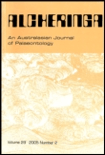
ALCHERINGA
Advancing Understanding in Biological and Geological SciencesALCHERINGA, published by Taylor & Francis Ltd, is a distinguished academic journal that has been at the forefront of research in the fields of ecology, evolution, behavior, systematics, and paleontology since its inception in 1975. With an ISSN of 0311-5518 and E-ISSN 1752-0754, this journal serves as a critical platform for the dissemination of high-quality research, contributing significantly to the understanding of biological and geological sciences. Ranking in the Q3 quartile for both Ecology, Evolution, Behavior and Systematics, as well as Paleontology, ALCHERINGA is well-positioned within the academic community, attracting submissions from researchers across the globe. The journal's Scopus ranks further highlight its relevance, particularly its position in the 51st percentile for Ecology and the 50th percentile for Paleontology. Although it does not operate under an open access model, ALCHERINGA remains committed to providing valuable insights and fostering discussions that are essential for the advancement of these vital scientific disciplines. Researchers, professionals, and students are encouraged to explore the profound implications of the studies published within, making it an indispensable resource for anyone aiming to deepen their expertise in these fields.

Stratigraphy
Exploring the Depths of Geological TimeStratigraphy is a distinguished journal dedicated to advancing the field of paleontology and stratigraphic research. Published by MICRO PRESS in the United States, this journal is accessible via its ISSN 1547-139X and E-ISSN 2331-656X, providing an essential platform for researchers, professionals, and students alike. With a robust focus on the intricate relationships between geological time and the fossil record, Stratigraphy aims to disseminate high-quality research that enhances our understanding of Earth’s history. Its ranking within the 2023 Q2 category of paleontology reflects its commitment to scholarly excellence, as noted by a Scopus ranking of #65 out of 113 in the Earth and Planetary Sciences domain, placing it in the 42nd percentile. Although not open access, the journal's valuable contributions from 1988 to 2024 encourage a collaborative dialogue among the scientific community, underscoring the significance of stratigraphic studies in environmental and evolutionary research.

JOURNAL OF THE PALAEONTOLOGICAL SOCIETY OF INDIA
Unearthing India's Rich Paleontological HeritageThe JOURNAL OF THE PALAEONTOLOGICAL SOCIETY OF INDIA, published by SAGE PUBLICATIONS INDIA PVT LTD, stands as a significant resource in the field of paleontology, dedicated to disseminating high-quality research and findings from the Indian subcontinent and globally. With an ISSN of 0552-9360, this journal has established itself within the academic community, particularly as it converges its publication years from 2011 to 2024. Ranking in the Q4 category of paleontology as of 2023, it serves an essential niche for researchers and students interested in the historical biological records and evolutionary processes. Despite its current Scopus ranking of #88 out of 113 in the Earth and Planetary Sciences category, the journal plays a pivotal role in fostering scholarly dialogue and advancing the understanding of paleontological sciences in India and beyond. Researchers are encouraged to contribute to this evolving field and share their findings, solidifying the journal's commitment to highlighting significant paleontological research contributions.
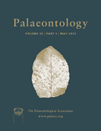
PALAEONTOLOGY
Bridging Science and History: The Essence of PaleontologyPALAEONTOLOGY, published by Wiley in the United Kingdom, is a leading journal dedicated to advancing the knowledge of Earth's biological history through the study of fossilized remains. With an ISSN of 0031-0239 and an E-ISSN of 1475-4983, this journal has established itself as a premier resource in the field, boasting a remarkable Q1 ranking in both Paleontology and Ecology, Evolution, Behavior and Systematics according to the 2023 category quartiles. Its commitment to high-quality research is evidenced by its Scopus rankings, placing it in the 93rd percentile among paleontology journals. While PALAEONTOLOGY is not currently open access, its extensive archival reach from 1979 to 2024 ensures that vital research findings remain accessible to the academic community. This journal not only acts as a platform for cutting-edge research but also fosters collaboration among scientists, students, and professionals interested in the implications of paleontological studies on contemporary ecological and evolutionary issues.
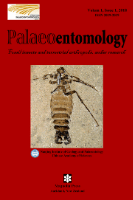
Palaeoentomology
Connecting the Dots of Time: Fossils, Insects, and Ecosystem DynamicsPalaeoentomology is a leading journal dedicated to the study of fossil insects, fostering a deeper understanding of historical biodiversity and ecosystem dynamics. Published by MAGNOLIA PRESS, this journal provides an essential platform for researchers, educators, and students interested in entomological paleontology and related disciplines. Featuring a wide range of articles that explore fossil records, evolutionary patterns, and paleoenvironments, it serves the scientific community by enriching our understanding of the past. Although currently not open access, the journal prioritizes rigorous peer-review standards and aims to maintain a high impact factor, ensuring that published research meets the evolving demands of the field. Based in Auckland, New Zealand, it welcomes contributions from both established and emerging scientists worldwide, contributing to a vibrant discourse in the study of ancient insects and their ecological relationships.

Fossil Record
Bridging the Gap Between Past and PresentFossil Record is a prestigious open access journal pioneering the field of paleontology, published by Pensoft Publishers in Germany. Since its inception in 1998, it has provided a vital platform for the dissemination of groundbreaking research that advances our understanding of ancient life and environmental change through time. Holding an impressive Q2 quartile ranking in the field and securing a notable position among the top 73rd percentile of paleontological journals, Fossil Record ranks #31 out of 113 in the Scopus classification of Earth and Planetary Sciences. With a commitment to quality and accessibility, the journal not only encourages critical dialogue among researchers, professionals, and students but also promotes the sharing of knowledge worldwide. Explore its comprehensive repository of articles to stay abreast of the latest findings that shape our understanding of the planet’s history.
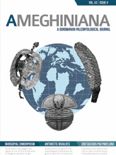
AMEGHINIANA
Documenting the Evolutionary Journey of SpeciesAMEGHINIANA is a distinguished academic journal published by the ASOCIACION PALEONTOLOGICA ARGENTINA, serving as a vital platform for the dissemination of cutting-edge research in the fields of Ecology, Evolution, Behavior and Systematics, as well as Paleontology. With its ISSN 0002-7014 and E-ISSN 1851-8044, the journal has established itself as a key reference point for scholars seeking to explore the intricate relationships within ecological systems and the evolutionary history of species. Despite not offering open access, AMEGHINIANA maintains a reputation bolstered by a Q3 ranking in both its subject categories, underlining its sustained commitment to enhancing scientific knowledge. Researchers and professionals alike benefit from this journal’s extensive archive of studies dating back to 1985, with ongoing contributions expected until 2024. With a focus on high-quality content, this journal is essential for anyone immersed in the study of paleobiology and ecological systems.

Palaeoworld
Innovating Research at the Intersection of Time and NaturePalaeoworld is a leading peer-reviewed journal published by ELSEVIER, focusing on the dynamic and interdisciplinary fields of paleontology, ecology, and stratigraphy. Established in 2006, the journal aims to facilitate the dissemination of innovative research and significant discoveries that enhance our understanding of past life on Earth. With an impressive impact factor and categorized in the second quartile (Q2) for Ecology, Evolution, Behavior and Systematics, Paleontology, and Stratigraphy in 2023, Palaeoworld stands out in its commitment to high-quality scholarship. The journal is indexed in Scopus, ranking #23 in Paleontology and #14 in Stratigraphy, placing it within the top 20% of publications in these categories. As a valuable resource for researchers, professionals, and students alike, it provides unrestricted access to cutting-edge findings, detailed methodologies, and critical assessments of paleo-environmental data. This journal is not only a repository of knowledge but also a platform for advancing discussions that bridge past ecological patterns with contemporary issues.